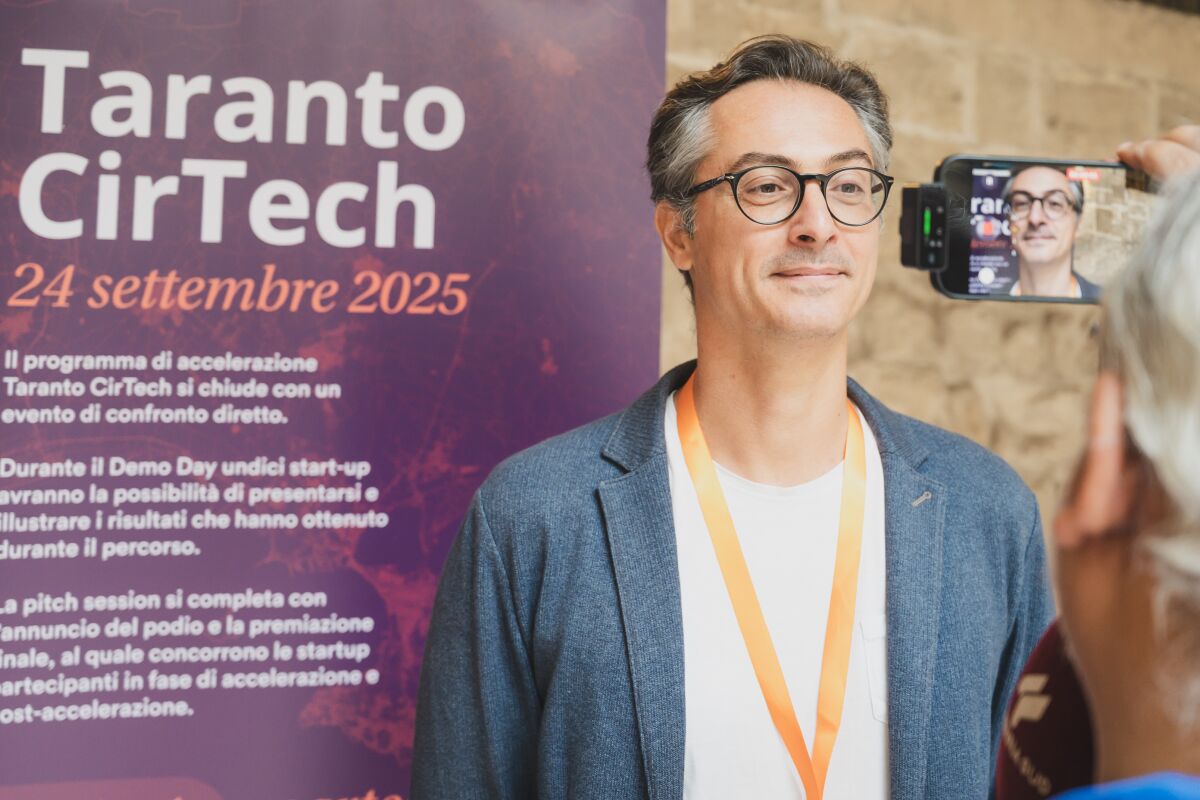Francesco Castellano, President of Tondo, recounts the success of the initiative supported by MUSA to promote the circular economy and startups in Southern Italy.
The mission of Tondo, the organization led by Francesco Castellano, is to put the circular economy at the center of development in Southern Italy. Tondo chose Taranto as the location for Taranto CirTech, an acceleration program dedicated to sustainable innovation. “We decided to base the project in Taranto,” explains Castellano, “to enhance an area we already knew through previous experiences, such as Taranto Circolare. The goal was to promote innovation and the circular economy in Southern Italy, particularly in Puglia.”
The project was launched in collaboration with MUSA – Multilayered Urban Sustainability Action, thanks to a grant won by Tondo. “We followed the guidelines and objectives of MUSA,” says Castellano, “promoting sustainability, innovation, and scientific research. All the selected startups have strong ties to the research world, especially with the CNR (National Research Council) and universities in the South.”
Among the featured projects are Be.Me and AraBat, two ventures born in synergy with the with territorial scientific research. The former develops the first bio-derived and circular electrode for batteries and supercapacitors, combining natural thermoplastic biopolymers with electrically conductive carbon obtained from the recycling of composite materials. The latter is a cleantech startup that tackles the problem of recycling lithium batteries and other critical industrial waste, transforming waste into new, high value-added resources.
The call for startups received responses from numerous Southern Italian companies, especially from Puglia and Taranto, with a high level of innovation in the field of the circular economy. “We were very satisfied with the quality of the proposals,” notes Castellano, “and we selected eleven startups: nine for acceleration and two for pre-acceleration.”
The Tondo team, comprised of young professionals and supported by local collaborators, worked in synergy with universities and research centers such as the University of Bari, the University of Foggia, the Polytechnic University of Bari, CNR-IRSA, and CIHEAM (a research center located between Bari and Taranto), and the LUM University of Bari.
The Taranto CirTech presentation event was also attended by Andrea Sianesi from the Polytechnic University of Bari, Gianluca De Gennaro from BALAB, Vincenzo Di Canio, the Remediation Commissioner, and Carlo Gadaleta Caldarola from ARTI Puglia, in addition to the Mayor of Taranto, Pietro Bitetti, representing the city.
Taranto CirTech also created a bridge between startups, the productive sector, and the research system. The event saw the participation of investment funds and institutional partners such as Eureka! Venture, Vertis SGR, and UniCredit Start Lab. “We wanted to encourage the formation of concrete relationships with funds and the industrial part of the territory,” explains Castellano, “and in the coming months, we will continue to support the projects so that they can meet investors and develop new local collaborations.”
For Tondo, Taranto CirTech represents an important step in disseminating the MUSA model, which is capable of connecting research, businesses, and startups to address the challenges of urban sustainability.
Among the projects that emerged from the acceleration program are the three Taranto CirTech winners:
- B&Y (first place), which transforms stone dust, sludge, and scrap into a low-impact 3D-printable mortar for urban furniture and sustainable construction.
- 2pack (second place), which develops a water-repellent and compostable paper-based material from fish waste and other organic residues for the production of eco-friendly packaging.
- CrioPura (third place), which created a regenerable polymeric cryogel capable of removing heavy metals and phosphates from water, enabling its recovery and reuse.
Looking ahead, Castellano confirms the intention to strengthen Tondo’s presence in Southern Italy and expand collaborations with local institutions: “We want to continue on this path, leveraging territorial opportunities and also working on entrepreneurship education. Thanks to the hackathons, we managed for the first time to bring two projects all the way to the acceleration phase, which is a very significant result for us.”
Taranto CirTech demonstrates that it is possible, even in the South, to build a circular innovation ecosystem that unites scientific expertise, startups, and productive entities. “Our goal,” concludes Castellano, “is to continue to grow this model, fostering the birth of new sustainable businesses and contributing to the economic and environmental development of the territory.”





